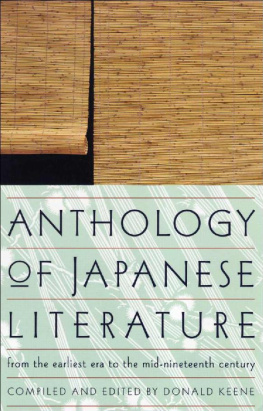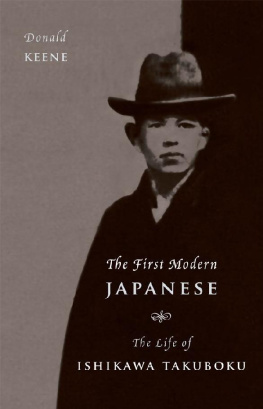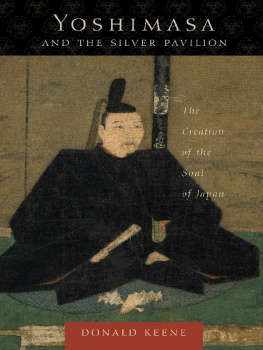Keene - Modern japanese literature: an anthology compiled and edited by Donald Keene
Here you can read online Keene - Modern japanese literature: an anthology compiled and edited by Donald Keene full text of the book (entire story) in english for free. Download pdf and epub, get meaning, cover and reviews about this ebook. City: New York, year: 1956, publisher: Grove Press;Grove Weidenfeld, genre: Detective and thriller. Description of the work, (preface) as well as reviews are available. Best literature library LitArk.com created for fans of good reading and offers a wide selection of genres:
Romance novel
Science fiction
Adventure
Detective
Science
History
Home and family
Prose
Art
Politics
Computer
Non-fiction
Religion
Business
Children
Humor
Choose a favorite category and find really read worthwhile books. Enjoy immersion in the world of imagination, feel the emotions of the characters or learn something new for yourself, make an fascinating discovery.

- Book:Modern japanese literature: an anthology compiled and edited by Donald Keene
- Author:
- Publisher:Grove Press;Grove Weidenfeld
- Genre:
- Year:1956
- City:New York
- Rating:4 / 5
- Favourites:Add to favourites
- Your mark:
- 80
- 1
- 2
- 3
- 4
- 5
Modern japanese literature: an anthology compiled and edited by Donald Keene: summary, description and annotation
We offer to read an annotation, description, summary or preface (depends on what the author of the book "Modern japanese literature: an anthology compiled and edited by Donald Keene" wrote himself). If you haven't found the necessary information about the book — write in the comments, we will try to find it.
Keene: author's other books
Who wrote Modern japanese literature: an anthology compiled and edited by Donald Keene? Find out the surname, the name of the author of the book and a list of all author's works by series.
Modern japanese literature: an anthology compiled and edited by Donald Keene — read online for free the complete book (whole text) full work
Below is the text of the book, divided by pages. System saving the place of the last page read, allows you to conveniently read the book "Modern japanese literature: an anthology compiled and edited by Donald Keene" online for free, without having to search again every time where you left off. Put a bookmark, and you can go to the page where you finished reading at any time.
Font size:
Interval:
Bookmark:
WORKS BY DONALD KEENE
Published by Grove Press
Anthology of Chinese Literature, Vol. I: From Early Times to the 14th Century
(with Cyril Birch, ed.)
Anthology of Japanese Literature from the Earliest Era to the Mid-Nineteenth Century
Modern Japanese Literature: An Anthology
MODERN JAPANESE LITERATURE

JAPANESE LITERATURE
an anthology
compiled and edited by
Donald Keene

Copyright 1956 by Grove Press, Inc.
All rights reserved. No part of this book may be reproduced in any form or by any electronic or mechanical means, including information storage and retrieval systems, without permission in writing from the publisher, except by a reviewer, who may quote brief passages in a review. Any members of educational institutions wishing to photocopy part or all of the work for classroom use, or publishers who would like to obtain permission to include the work in an anthology, should send their inquiries to Grove/Atlantic, Inc., 841 Broadway, New York, NY 10003.
This volume is published in accordance with an arrangement between UNESCO and the Japanese government.
Material from Wheat and Soldiers reprinted by permission of Rinehart & Company, Inc.
Frontispiece by Nenjir Inagaki. Reproduced by courtesy of Mikumo Wood-block Print Company, Kyoto, Japan.
Published simultaneously in Canada
Printed in the United States of America
Library of Congress Catalog Number 56-8439
ISBN-13: 978-0-8021-5095-0
Grove Press
an imprint of Grove/Atlantic, Inc.
841 Broadway
New York, NY 10003
Distributed by Publishers Group West
www.groveatlantic.com
09 10 11 12 30 29 28 27 26
TO TED AND FANNY DE BARY
Japanese names are given in this book in the Japanese order: that is, the surname precedes the personal name. Thus, in the name Natsume Sseki, Natsume is the family name, Sseki the personal name.
The pronunciation of Japanese in transcription is very simple. The consonants are pronounced as in English (with g always hard), the vowels as in Italian. There are no silent letters. Thus, the name Mine is pronounced mee-nay. In general, long vowels have been indicated by macrons, but in some stories they have been omitted, as likely to seem pedanticisms.
Sam Houston Brock
Robert H. Brower
Harold G. Henderson
Howard Hibbett
Glenn Hughes
Baroness Shidzu Ishimoto
Yozan T. Iwasaki
Donald Keene
Ivan Morris
W. H. H. Norman
Shio Sakanishi
G. W. Sargent
Edward Seidensticker
Burton Watson
Meredith Weatherby
It may come as a surprise to some readers that this volume, devoted to the Japanese literature of the last eighty or so years, should be as long as my Anthology of Japanese Literature, which covers more than a thousand years. The disproportion is largely to be explained in terms of the amount of literature which has poured from the printing presses in recent times. All the literature which survives from, say, the thirteenth century can hardly compare in bulk with what any single year now produces. But it is not only by mere numbers that modern Japanese literature earns the right to be heard; its quality is remarkably high, and compares with that written anywhere in the world.
The choice of material for inclusion has been difficult to make. It is a commonplace of literary history that many works highly esteemed in their own day are subsequently doomed to oblivion. It also happens, though less frequently, that a book which passed almost unnoticed in its own time is later seen to be a treasure of the literature. These are the dangers which beset the compiler of anthologies of modern works, and I cannot hope to have escaped them altogether. I shall be very glad if no glaring injustices have been made. I have included very little solely for historical reasons. The novels of the 1890s have suffered in particular as a result of this policy. Although they are still highly regarded by some Japanese critics, they seem unbearably mawkish today, as I think most people will agree who have read the existing translations of such works as Ozakis Golden Demon.
It is the custom of Japanese critics to divide the modern period into the reigns of the three Emperors: Meiji (1868-1912), Taish (1912-1926), and Shwa (since 1926). These distinctions have some meaning, as our use of the twenties or the thirties conjures up an era, but it has not been felt necessary to observe the lines of these demarcations in a book intended for Western readers.
Few of the translations given here have ever before appeared in print. Most were made especially for this volume, and I wish to express my thanks to all the translators. I am particularly indebted to Edward Seidensticker for his willingness on repeated occasions to drop whatever else he was doing and turn out for this book a remarkably fine translation. Carolyn Kizer has kindly looked over my translations of modern poetry and offered many valuable pointers. Other help, at a time when I needed it badly, I have acknowledged, however inadequately, in the dedication.
I am grateful to Kawabata Yasunari, President of the Japanese P.E.N. Club, for his kind intercession in obtaining permission to use works by living authors. Acknowledgments are also due to: International Publishers Co. for The Cannery Boat; the Japan Quarterly for The Mole; Alfred A. Knopf, Inc., publishers of Some Prefer Nettles, for permission to use other works by Tanizaki; W. H. H. Norman and the Hokuseido Press for Hell Screen; Glenn Hughes for The Madman on the Roof (from Three Modern Japanese Plays); New Directions for Villons Wife; and Rinehart & Co., Inc., for Earth and Soldiers (from Wheat and Soldiers).
Kyoto-New York
For an admirably detailed account of the literature written between 1868 and 1912, the reader should consult Japanese Literature in the Meiji Era by Y. Okazaki, translated by V. H. Viglielmo. (Tokyo, 1955.)
The transformation of Japan within the space of about forty years from an obscure oriental monarchy to one of the great powers is accounted a miracle of the modern age. With the most rapid efforts Japan shook off the encumbering weight of a past of isolation and ignorance, and astonished the world by victory in a war with Russia and the winning of an equal alliance with England. Military successes and the development of industrial enterprisesand also the growth of scientific learningmade Japan the leader of eastern Asia.
Many striking parallels may be drawn between the history and the literature of Japan during this period. In 1868, when the youthful Emperor Meiji assumed control of the government after six centuries of rule by military men, Japanese literature had dropped to one of its lowest levels. The popular authors of the time specialized in books of formless, almost meaningless gossip. The country, which had been turned in on itself during almost 250 years of isolation, seemed to have exhausted its own resources. The gaiety had left the gay quarters, the center of much of the literature of the seventeenth and eighteenth centuries; and the rouged animation of anecdotes about the courtesans of the day was ugly and meretricious. And yet, within the same forty years that elapsed between the Meiji Restoration and the Russo-Japanese War, Japanese literature moved from idle quips directed at the oddities of the West to Symbolist poetry, from the thousandth-told tale of the gay young blade and the harlots to the complexities of the psychological novel.
Next pageFont size:
Interval:
Bookmark:
Similar books «Modern japanese literature: an anthology compiled and edited by Donald Keene»
Look at similar books to Modern japanese literature: an anthology compiled and edited by Donald Keene. We have selected literature similar in name and meaning in the hope of providing readers with more options to find new, interesting, not yet read works.
Discussion, reviews of the book Modern japanese literature: an anthology compiled and edited by Donald Keene and just readers' own opinions. Leave your comments, write what you think about the work, its meaning or the main characters. Specify what exactly you liked and what you didn't like, and why you think so.












